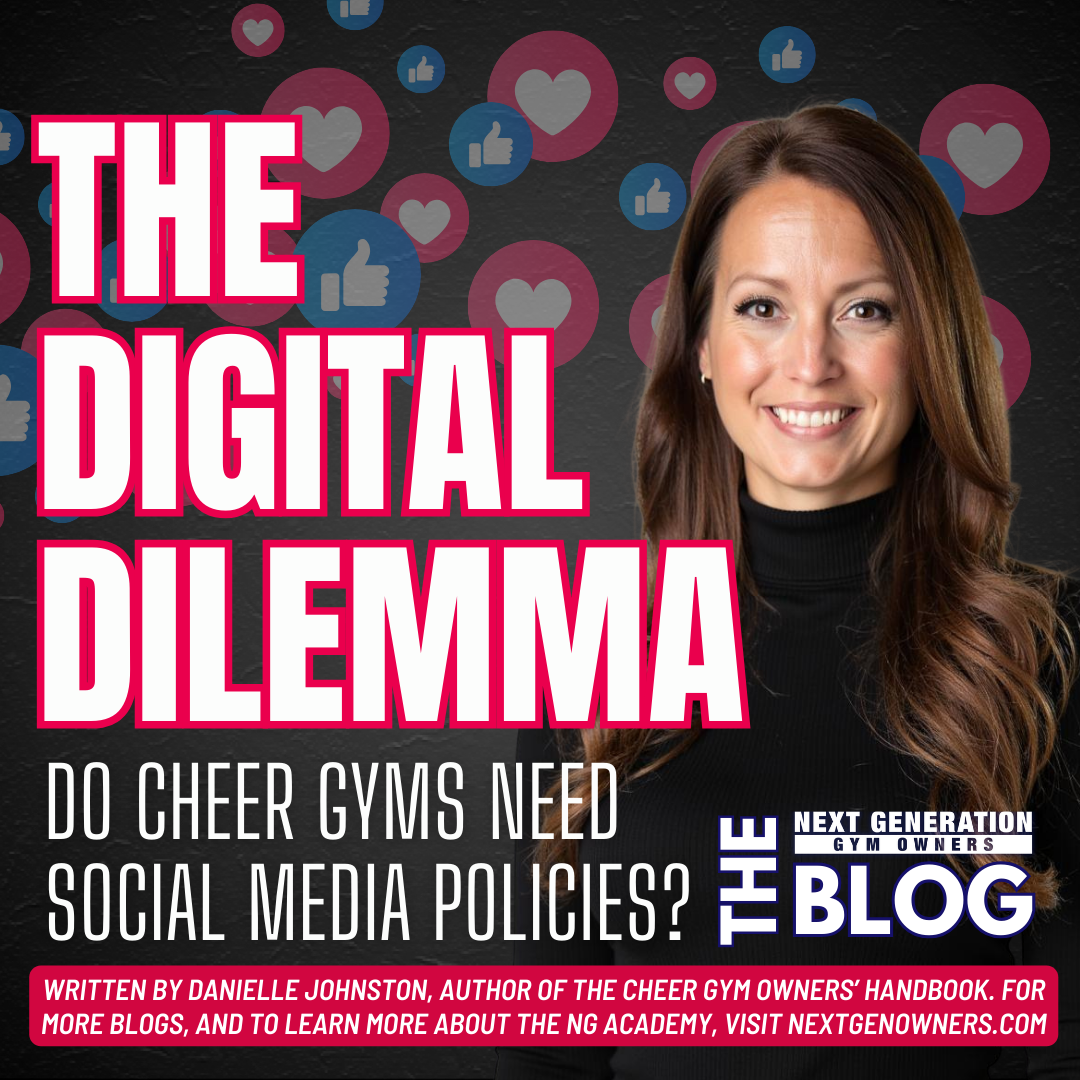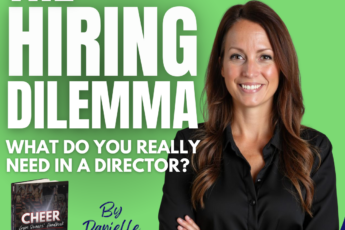Many gyms have social media policies in place for their athletes and staff. In fact, we all see stuff on the internet in our gym apparel and slowly close our eyes hoping no one else has seen it. After all if they’re in uniform, their content represents our gyms, right? But do these social media policies violate their right to free speech, and truly, does it represent my gym?
Recently, one of my athletes, who is also a junior coach, was pictured on social media making a derogatory gesture. Two parents sent me the photo. The athlete wasn’t in uniform, but in one of the photos, she was at a team event—and to make matters even more complicated, she was not the one who posted the photo. This made me really think about the pros and cons of having a social media policy in a cheer gym. I have a policy for staff, but among athletes, I’ve always preferred to use social media as a teachable moment, and their parents have always been on board with that.
So I wonder, what can we legally control as owners? Where is the line between allowing personal expression and protecting our brand?
The Pros of Social Media Policies
1. Protecting Your Brand
If I made an obscene gesture in a Nike T-shirt, would that reflect poorly on Nike? Probably not. Yet, as gym owners, we fear this for our brands—maybe because of the smaller size of our businesses and the community presence for which so many of our gyms are known.
Or maybe it’s because parents entrust us with their kids. To them, our public image reflects our values. When your athletes and staff post on social media, they’re indirectly representing your gym. A staff member sharing a video of themselves engaging in inappropriate or illegal activities could harm your gym’s reputation among parents in your gym and within the community.
Truly, my staff, most of whom are in college, even know that having a little too much to drink on a Saturday night could be risky. In a small town, you’re likely to run into parents at just about any bar.
2. Setting Standards
A social media policy can set clear expectations for your athletes and staff, ensuring everyone is on the same page about your gym’s professional image. It can also give you a framework for addressing issues fairly and consistently, instead of making subjective judgments.
Have you ever had trouble addressing a social media issue in your gym? Would a consistent policy help, or would it cause more tension?
3. Guiding Impressionable Young Athletes
Our younger athletes are often impressionable and look up to older teammates and staff. What they see from them can shape their behavior.
Ask yourself: What lessons are your younger athletes unintentionally learning from what older team members post on social media? Would a social media policy encourage older athletes to be positive role models?
The Cons of Social Media Policies
1. Freedom of Expression
While the right to free speech in the U.S. doesn’t mean anyone can post anything online without consequences, it does mean we are treading on thin ice when we try to control personal social media accounts. And in the past few years, it seems people have become even more expressive (and perhaps more willing to express conflicting views and behavior) and less willing to let others—employers included—tell them what to do on social media. I know someone who posted an opinion about a government policy recently, and because the funding for his position is through the government, he was asked to remove his post by the employer. While researching for this article, I asked him what would have been the consequences if he hadn’t. He mentioned though they couldn’t have fired him, they could have made his position far more difficult in the day-to-day work for lack of compliance.
2. Potential Backlash
Strict social media policies can make athletes and staff feel micromanaged and undervalued. This can hurt morale and lead to higher turnover; if someone feels like they have to walk on eggshells at your gym, they may look for another one. Would you be able enforce social media standards without alienating your team and your athletes?
3. Legal Nuances
Cheer gym owners can prohibit illegal or harmful behavior, but policing gray areas—like provocative poses or public intoxication—is a little tricky. And for employees specifically, regulating what they say about your gym online could violate federal labor laws. The past few years as marijuana has become recreationally legal in many states, I’ve been faced with the same question. What would I do if a staff member showed up for work smelling of it? Of course, they wouldn’t be able to work under the influence, but what if they weren’t under the influence but simply smelled of it? The legal web makes all of this far more complicated as we navigate how to lawfully employ people. (Regardless of “right to work” status of your state, a wrongful termination suit could still damage your reputation and get you hung up in an expensive court case for months.)
Gray Areas To Consider
Let’s say an inappropriate photo is posted of an athlete or staff member. Does it make a difference whether they are at the gym event versus somewhere else? What about whether they are wearing branded gym apparel or not? If they’re outside the gym and in personal clothing, does their behavior still reflect on your brand?
What if the person in the photo is not the one who posted it? What if it was posted by someone else at the gym, a friend outside the gym, or even a parent? Who is held accountable?
I don’t really have the answers for you here, but what I do know is that for many years the “industry standard” has told us we have control over things like this when it comes to our staff and even our athletes. I’m not sure that we legally do.
A Balanced Approach
As gym owners, we have to decide what is worth addressing and what isn’t. Here are the tips I’ve landed on:
Clear Boundaries for Staff
While athletes’ social media might be tough to manage, it’s fair to expect a certain level of professionalism from your employees. Risque behavior of your well-known coaches can definitely impact your ability to conduct business well. Include social media policies in staff contracts, but try to keep them reasonable. Our goal here isn’t to control their posts, but to protect our brand. I suppose the ideal answer here to is to get to know candidates well before hiring them. Identify their morals and character as much as possible through the interview process so you know this person is unlikely to make posts like this in the first place.
Education on Consequences
Are your athletes and staff aware of how one post could affect not just the gym’s reputation, but their own futures? Talk about social media and personal branding with your athletes and staff (though I would meet with each group separately). Teach them about the long-term consequences of what they post on the internet. A lot of employers will take to social media to learn about you before ever calling you for an interview. Simply having a locked account won’t always do the trick. We often look to see if there are mutual friends among our current staff and ask their opinions prior to calling someone for an interview. In fact, Justin and I have had five foreign exchange students. For 2025, we were considering a Brazilian student whose social media account was locked. I reached out to my former Brazilian student who requested to follow and was accepted simply by affiliation. She was able to let us know if, based on social media, she thought the future student would be a good fit or not. This could be eye-opening for many of your athletes – the length at which someone is willing to go to know you prior to accepting an interview.
Lead by Example
If you want your athletes to represent your gym well, it starts with you and your staff. Model the behavior you want to see. If athletes shouldn’t post rude comments about another cheer gym online, you shouldn’t either. The same goes for gym owners posting passive-aggressive and overly vague negative messages toward current or former gym parents.
Final Thoughts
So, do we need social media policies in our cheer gyms? I say yes for staff—having at least a basic policy in place ensures everyone in your gym understands how their online presence impacts your gym’s reputation and brand, and it gives you a leg to stand on if you need to hold someone accountable. Exactly what it covers, though, is up to your discretion as the owner.
For help creating a social media policy that protects your brand and complies to applicable laws, I recommend reaching out to Matthew Becker at GymLawyers.com.








